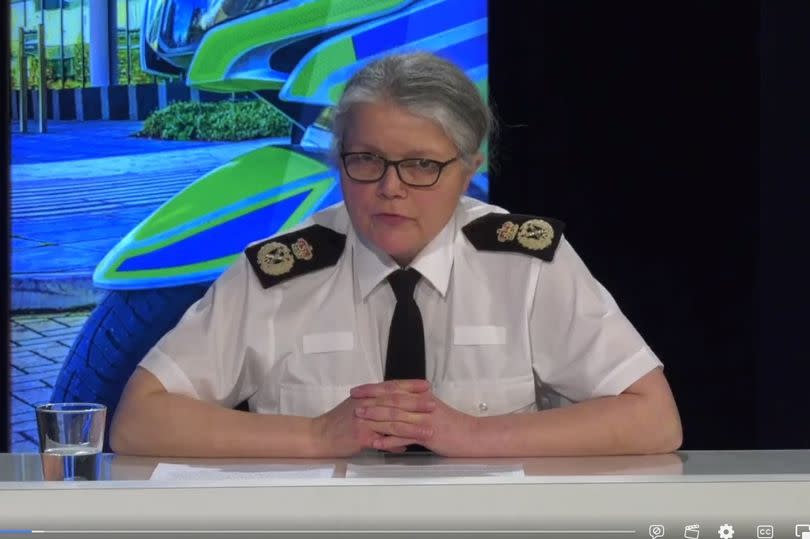Avon and Somerset Police confront institutional racism but admit there's 'more work to do'

The chief constable of Avon & Somerset Police says the force has been on a transformative journey after admitting it was institutionally racist. This admission set the stage for a journey towards becoming an anti-racist service, aligning with both the National Police Race Action Plan and local recommendations.
One year later, the force has released a comprehensive report detailing their progress and continued commitment to this critical mission. Chief Constable Sarah Crew said: “When I made the statement on institutional racism, I said I would come back in one year to update on the progress we have made, to back my words with action.
“The report we are publishing documents the activity that has taken place since then and, importantly, sets out how we will continue our progress in becoming a truly anti-racist organisation; maintaining momentum to improve trust and confidence in communities where it is most needed.”
Read next
One of the most significant developments has been the introduction of the Race Matters programme, a multifaceted initiative encompassing stop and search policies, a new deferred prosecution scheme called Chance to Change, and comprehensive cultural awareness training for officers and staff. The aim is to reduce disproportionality and foster a more just relationship between the police and the communities they serve.
An element of this reform is the launch of a stop and search policy, co-produced with community members. This policy aims to ensure that officers use their powers legitimately and ethically, with clear expectations set for officer conduct.
In collaboration with Creative Power Town (CPT), a community interest company based in St Pauls, Avon and Somerset Police created "Unjust Stop," a short film by young people, for young people. This film educates children and young adults about their rights during stop and search encounters, empowering them with knowledge and resilience.
Sign up to receive daily news updates and breaking news alerts straight to your inbox for free here.
Omari Cato, chief executive of CPT, reflected on the project's inception, recalling an incident that underscored the need for such initiatives.
"I came out of our centre, a police officer came to us while we were laughing and joking," he said. "[The officer] literally just walked up to us and said 'are you lot selling drugs' and was being quite blunt, rude and straight to the point. I kind of thought, like, that bad policing makes the community look at them like enemies."
Another cornerstone of the initiative is the Chance to Change scheme, launched on June 1. This deferred prosecution model offers young people arrested for certain offenses an opportunity to engage with tailored programs addressing their needs, rather than entering the criminal justice system. Notably, the scheme does not require an admission of guilt, which is crucial for individuals from racially and ethnically minoritized backgrounds who may have lower trust in the police.
Evidence from pilots in London shows a 58 per cent reduction in reoffending rates for young adults who participated in similar schemes. Importantly, this approach has also helped eliminate disproportionality in charging decisions for non-white individuals.
Central to these reforms is the Race Matters training program, which has already seen 1,500 frontline officers undergo comprehensive cultural awareness training. This program, developed in partnership with Aisha Thomas of Representation Matters, aims to deepen officers' understanding of race-related issues and their relevance to policing.
The training will continue to evolve, with plans to establish a network of race allies who can apply their learning within their teams, ensuring a sustained shift towards an anti-racist organisational culture.
Despite these strides, challenges remain. Figures for the first five months of 2024 reveal that black individuals are still six times more likely to be subjected to stop and search than their white counterparts in the Avon and Somerset area. While this is a slight improvement from the previous summer, when the ratio was seven to one, the police acknowledge that there is "much more work to do."
The "Action after Words" report outlines new mandatory obligations, including the use of body-worn video during searches, special considerations for searches of children, and reviews for individuals stopped multiple times. All frontline officers are being trained on these new protocols to ensure they are applied consistently and fairly.
Chief Constable Sarah Crew added: “Had I not acknowledged that institutional racism exists in the organisation, I’m sure the work we are doing in this area would not have been successful – the communities most directly affected by it would not trust us, work with us or take us at our word. Without trust there is no consent, and without consent we no longer have legitimacy to police. It is this simple. It is fundamental.”

 Yahoo News
Yahoo News 
